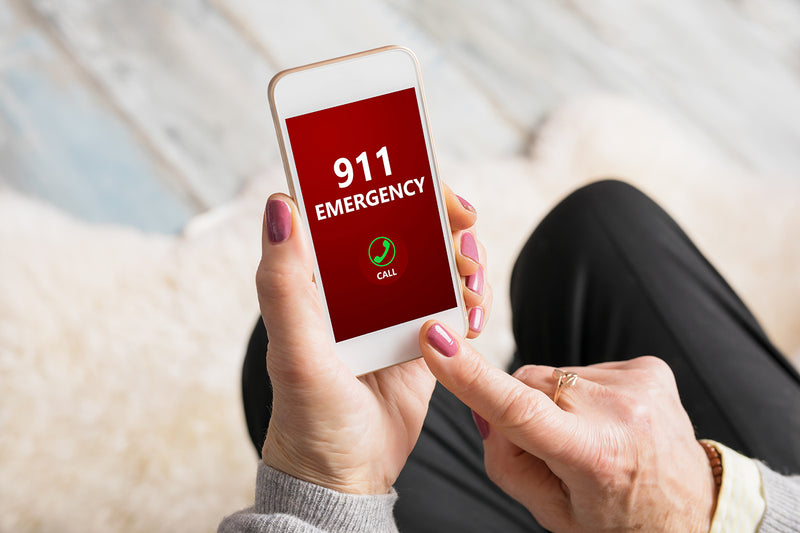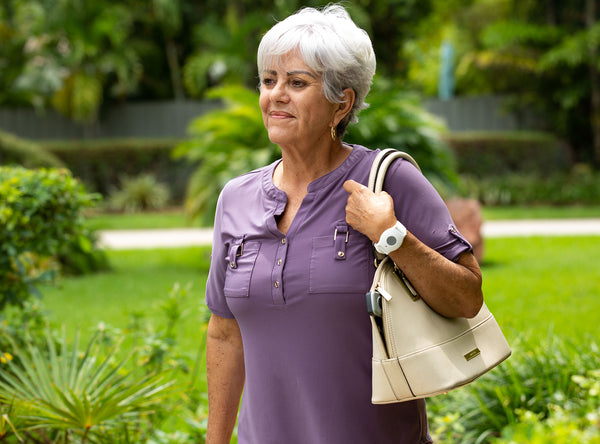Technology Simplified
Can 911 Track My Mobile Phone in the Case of a Medical Emergency?

In an emergency, every second counts. When someone calls 911 for help, they expect that emergency services will be able to quickly locate them and provide the assistance they need. However, this is not always the case. In fact, 911 can't always pinpoint your location in an emergency. This is why it's important to have a monitored medical alert system.
First, let's explore why 911 can't always locate you in an emergency. The answer is multifaceted, but one of the main reasons is that many emergency calls are made from mobile phones. When you make a call from a mobile phone, the location data that is transmitted to emergency services is not always accurate. This is because the location data is based on the signal from the nearest cell tower, which can be several miles away. This can make it difficult for emergency services to locate you precisely.
Another factor that can make it difficult for 911 to locate you is if you are in an area with poor cell phone coverage. In these situations, it may be impossible for emergency services to get a location fix on your phone. Additionally, if you are in a building with thick walls or a basement, it can be difficult for your phone's GPS to get a location fix.
Another factor to consider is that even if emergency services are able to get a location fix on your phone, it may not be accurate enough to pinpoint your exact location. GPS is generally accurate to within a few meters, but in some situations, such as in a building with many floors or in a densely populated area, this may not be enough to determine your exact location.
So what can you do to ensure that emergency services can locate you in an emergency? One solution is to get a monitored medical alert system. These systems are designed to provide assistance in an emergency and can be used to quickly summon help if you need it.
One of the main benefits of a monitored medical alert system is that it can provide emergency services with your exact location. These systems use GPS technology to pinpoint your location, which means that emergency services can quickly and accurately locate you in an emergency. This can be especially important if you are unable to speak or are in a situation where you cannot provide your location to emergency services.
Another benefit of a monitored medical alert system is that it can provide assistance in a variety of emergency situations. These systems are designed to provide assistance in medical emergencies, such as heart attacks or strokes, but they can also be used in other emergency situations, such as falls or home invasions. This can provide peace of mind to you and your loved ones, knowing that help is just a button press away.
Monitored medical alert systems also offer a number of additional features that can be helpful in an emergency. For example, many systems have fall detection technology that can automatically detect if you have fallen and summon help if you are unable to do so yourself. Some systems also offer medication reminders and can even provide monitoring for chronic conditions, such as diabetes.
When choosing a monitored medical alert system, there are a few things to consider. First, you should choose a system that offers GPS location tracking. This will ensure that emergency services can quickly and accurately locate you in an emergency. You should also choose a system that is easy to use and has a long battery life. Additionally, you should consider the range of the system, as well as any additional features that may be useful to you.
In conclusion, 911 can't always pinpoint your location in an emergency, which is why it's important to have a monitored medical alert system. These systems provide assistance in a variety of emergency situations and offer GPS location tracking, fall detection technology, and other helpful features. When choosing a monitored medical alert system, be sure to choose one that offers GPS location tracking and is easy to use. With a monitored medical alert system, trained agents can pinpoint your location using a variety of tools and get you the help that you need, where you need it.
First, let's explore why 911 can't always locate you in an emergency. The answer is multifaceted, but one of the main reasons is that many emergency calls are made from mobile phones. When you make a call from a mobile phone, the location data that is transmitted to emergency services is not always accurate. This is because the location data is based on the signal from the nearest cell tower, which can be several miles away. This can make it difficult for emergency services to locate you precisely.
Another factor that can make it difficult for 911 to locate you is if you are in an area with poor cell phone coverage. In these situations, it may be impossible for emergency services to get a location fix on your phone. Additionally, if you are in a building with thick walls or a basement, it can be difficult for your phone's GPS to get a location fix.
Another factor to consider is that even if emergency services are able to get a location fix on your phone, it may not be accurate enough to pinpoint your exact location. GPS is generally accurate to within a few meters, but in some situations, such as in a building with many floors or in a densely populated area, this may not be enough to determine your exact location.
So what can you do to ensure that emergency services can locate you in an emergency? One solution is to get a monitored medical alert system. These systems are designed to provide assistance in an emergency and can be used to quickly summon help if you need it.
One of the main benefits of a monitored medical alert system is that it can provide emergency services with your exact location. These systems use GPS technology to pinpoint your location, which means that emergency services can quickly and accurately locate you in an emergency. This can be especially important if you are unable to speak or are in a situation where you cannot provide your location to emergency services.
Another benefit of a monitored medical alert system is that it can provide assistance in a variety of emergency situations. These systems are designed to provide assistance in medical emergencies, such as heart attacks or strokes, but they can also be used in other emergency situations, such as falls or home invasions. This can provide peace of mind to you and your loved ones, knowing that help is just a button press away.
Monitored medical alert systems also offer a number of additional features that can be helpful in an emergency. For example, many systems have fall detection technology that can automatically detect if you have fallen and summon help if you are unable to do so yourself. Some systems also offer medication reminders and can even provide monitoring for chronic conditions, such as diabetes.
When choosing a monitored medical alert system, there are a few things to consider. First, you should choose a system that offers GPS location tracking. This will ensure that emergency services can quickly and accurately locate you in an emergency. You should also choose a system that is easy to use and has a long battery life. Additionally, you should consider the range of the system, as well as any additional features that may be useful to you.
In conclusion, 911 can't always pinpoint your location in an emergency, which is why it's important to have a monitored medical alert system. These systems provide assistance in a variety of emergency situations and offer GPS location tracking, fall detection technology, and other helpful features. When choosing a monitored medical alert system, be sure to choose one that offers GPS location tracking and is easy to use. With a monitored medical alert system, trained agents can pinpoint your location using a variety of tools and get you the help that you need, where you need it.







